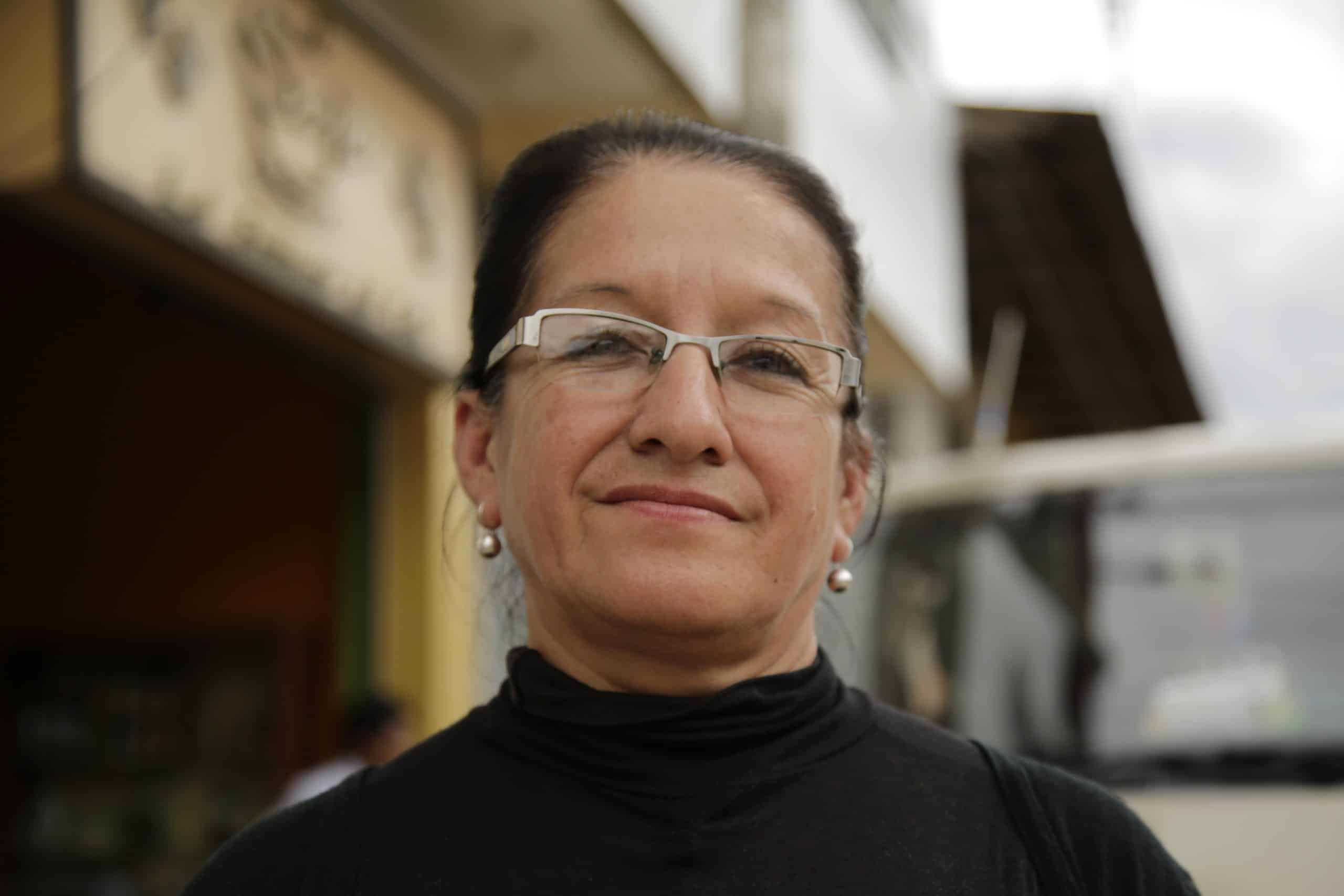
For years, Dora Lisa Carrión Gómez rose early every morning to open Saja, a café in the quiet Andean town of San Ignacio in northern Peru. Saja is owned and operated by members of the women’s group of APROCASSI, a coffee cooperative where, for a time, Dora Lisa also served as president. “Women have always been discriminated against,” says Dora Lisa. “But when I joined APROCASSI in 2006, I saw this new reality: a reality where women could work, could advance. A reality where women could have power.”
During Root Capital’s first 10 years, we did what a lot of organizations do: We tracked the number of women reached through our work. But over time, we realized that counting women isn’t enough. If we really wanted to deepen our impact—and our clients’ impact—on women like Dora Lisa, we had to actively create opportunities for them to advance and address the unique challenges standing in their way.
As Root Capital deepened its understanding of these challenges, we set out to determine how the small and growing agricultural businesses we work with could help level the playing field. With this in mind, in 2012 we launched our Women in Agriculture Initiative (WAI) to better support agricultural enterprises across our portfolio in generating opportunities that are inclusive of women.
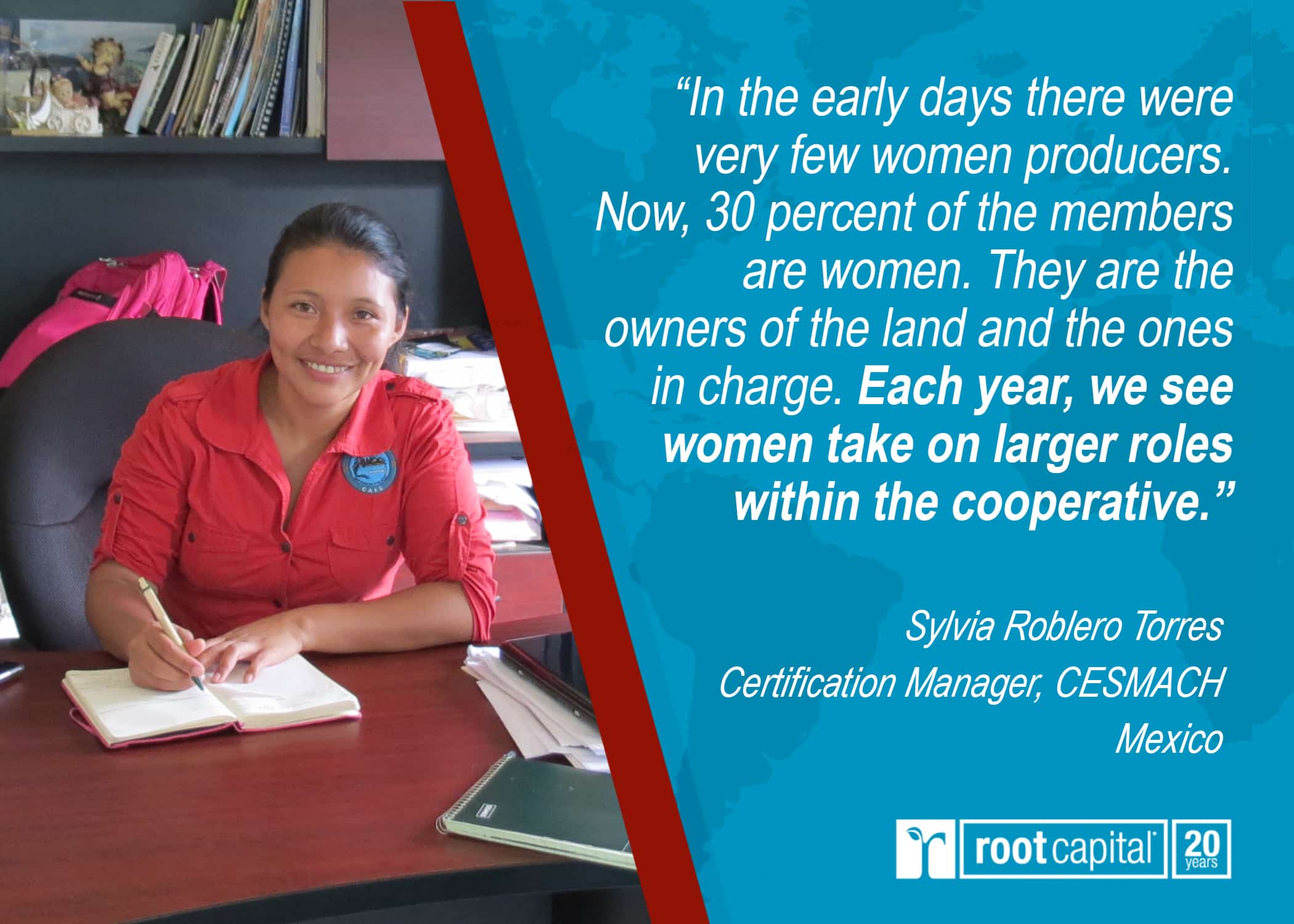
Defining what we mean by “gender inclusion”
The WAI initially focused on collecting data, studying, and learning about the role of women in agriculture, to better identify how Root Capital could work with our clients to support them. The first thing we did was launch a “gender scorecard,” through which our loan officers collect and report on a series of gender-related metrics—which then translate into a gender-inclusive rating for each business in our portfolio.
We looked closely at all of the important roles women play in agriculture—not only as farmers or entrepreneurs, but also those in middle positions such as agronomists or accountants. In recognition of these varied roles, our definition of “gender-inclusive” broadened. We consider a business gender-inclusive if there is at least 30% participation of women farmers, artisans, and employees, OR at least 20% participation of women farmers, artisans, and employees AND the business is led by a woman. Not only does this definition recognize the different ways that women exercise leadership in agricultural value chains; it also accounts for the highly male-dominated contexts and industries (like coffee) in which our clients work.
By actively identifying and investing in gender-inclusive businesses, we have increased the proportion of gender-inclusive businesses in our lending portfolio from 40% in 2014 to 48% in 2018. We also more than doubled the number of women farmers we reach annually, from 117K in 2014 to 246K in in 2018.
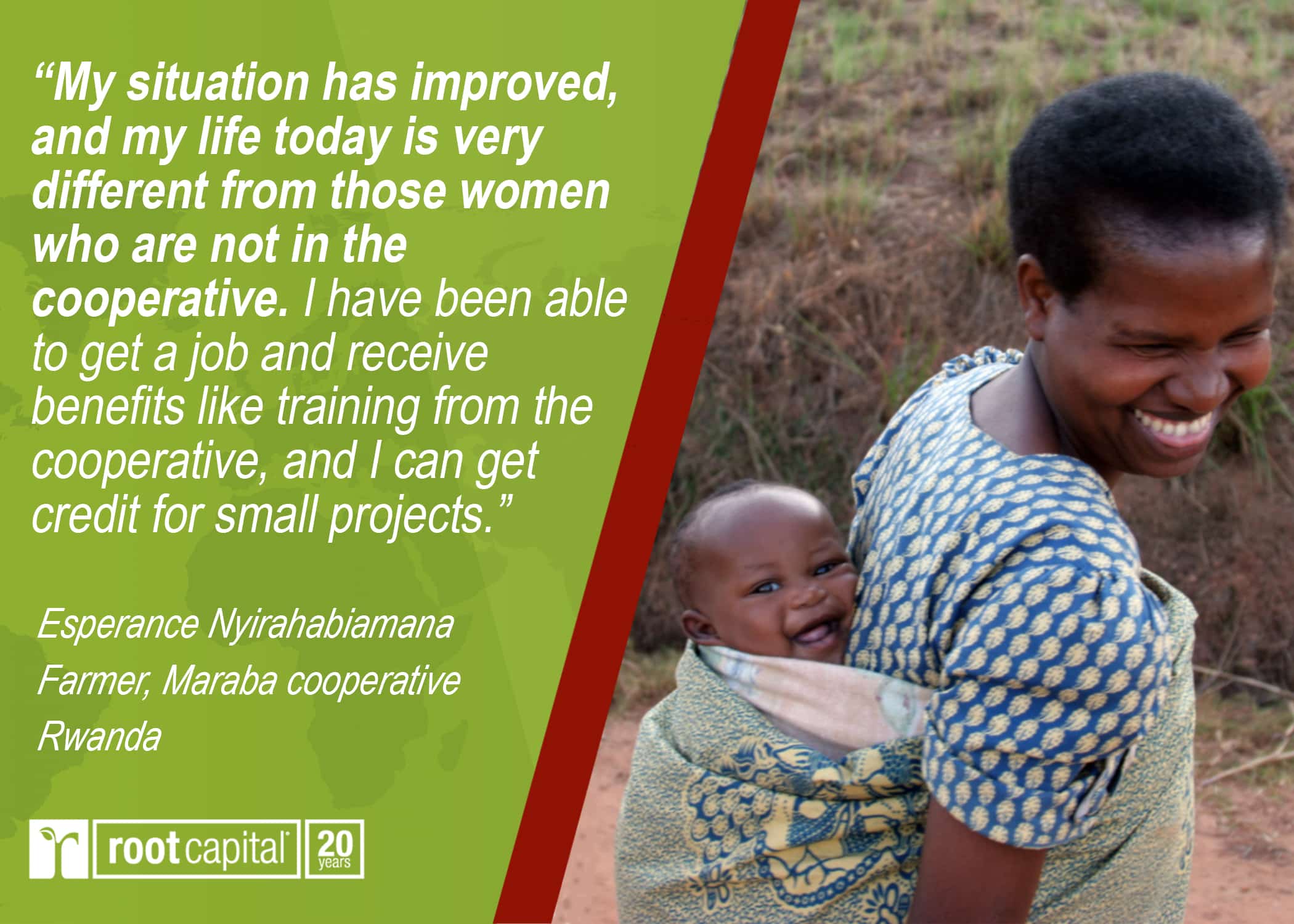
Understanding how agricultural enterprises impact women
To figure out how these numbers translate to impact, we also began conducting deep-dive impact studies with a subset of our clients. Through studies with dozens of businesses across value chains and geographies, we learned that:
-
Agricultural businesses generate new economic opportunities for women. For example, APROCASSI launched a brand of coffee exclusively from women farmers that they sell at Whole Foods. These women earn $10,000 more per container for their specialty brand than they otherwise would.
-
Agricultural businesses give women a voice in business and farm decision making. Many of our clients set up women’s committees, ensure women have seats on their boards, and, for worker-owned cooperatives, give women decision-making power in the business.
-
Agricultural businesses can help level the playing field for women farmers. Findings from our most recent impact study show that women affiliated with Root Capital clients in Peru earned 29% more cocoa income, produced 30% more cocoa, and were 58 percentage points more likely to receive technical assistance than women cocoa farmers not affiliated with the businesses.
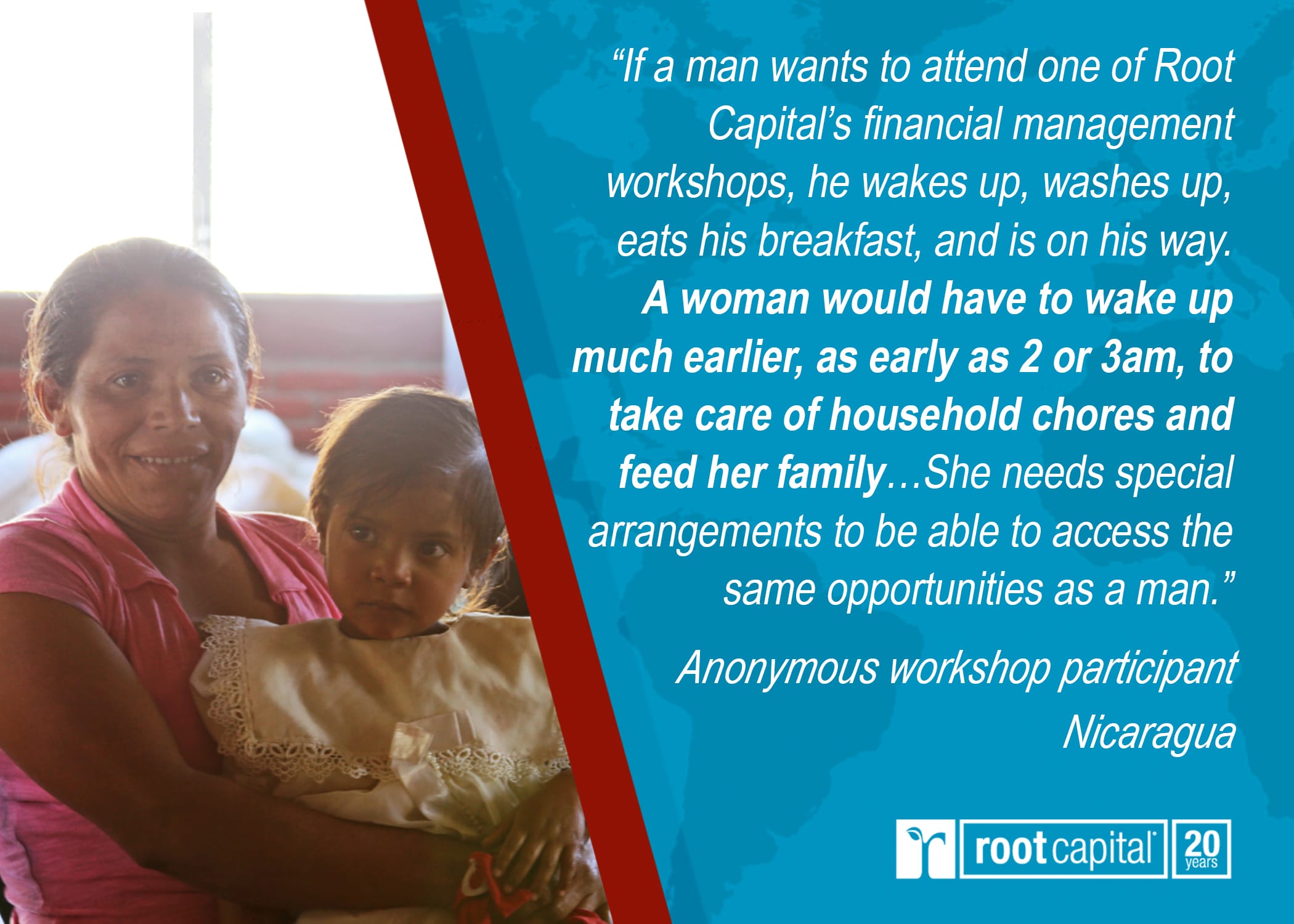
Ensuring qualitative—not just quantitative—inclusion
One of our first WAI achievements was the development of a “Gender-Inclusive Checklist” for our advisory services team, who implement workshops and on-site trainings to build the capacity of our client businesses. The checklist was prompted by a common occurrence in our early trainings: Our advisor would ask a question to workshop participants, and the women—who knew the answers!—would whisper to each other, but not speak up in front of the group because they didn’t feel empowered to do so.
We adopted the gender-inclusive checklist to ensure trainers are aware of gender dynamics and best practices for facilitating women’s inclusion. It includes commitments like providing childcare for participants, being thoughtful about the timing and location of workshops, and establishing rules against discriminatory language from participants. For example, when the women of our Guatemalan coffee client, Chajulense, established a sister organization selling handicrafts, they approached Root Capital for training on financial management. We organized the training times around women’s schedules—convening in the mornings and afternoons, with a several-hour break in the middle of the day to allow women to cook and serve lunch for their families. In many of the trainings, women brought their young children, with Root Capital covering the associated childcare costs.
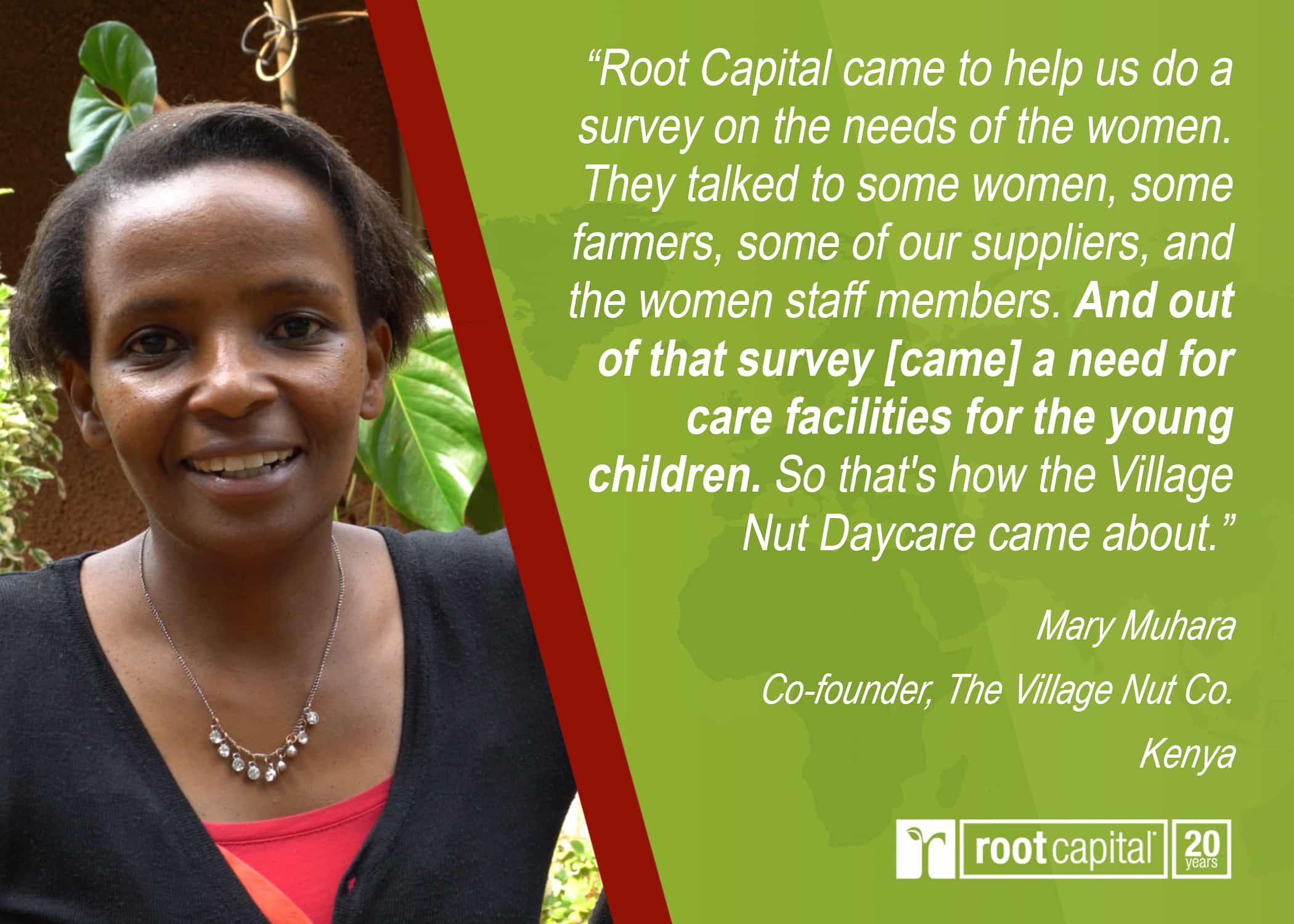
Raising the bar on inclusion, both externally and internally
The WAI has also taught us that catalyzing gender inclusion sometimes requires going above and beyond our usual credit-plus-capacity model. In 2016, we launched a Gender Equity Grants (GEGs) program that provides up to $20,000 in seed funding for businesses to design and implement targeted interventions to advance women’s inclusion. To date, we have provided 12 GEGs in Kenya and Peru. With these grants, businesses have constructed and staffed daycare centers for children of employees, established credit and savings circles primarily for women, created additional income-generating opportunities, and trained women to become cooperative leaders, among other things. An external evaluation of our GEG pilot in Kenya, conducted by our partner Value for Women, found them to be a resounding success. Women reported greater financial and personal security thanks to GEG-funded projects, while the businesses experienced reduced turnover and greater employee loyalty.
In order to “walk the talk,” we also turned the mirror on ourselves. We internalized gender equity as an organizational value and as part of Root Capital’s leadership principles. Among other steps, we’ve revised our global compensation philosophy and improved the gender balance in our organizational leadership. Today, we are proud to report that half of our executive leadership team, and more than half of our staff, are women.
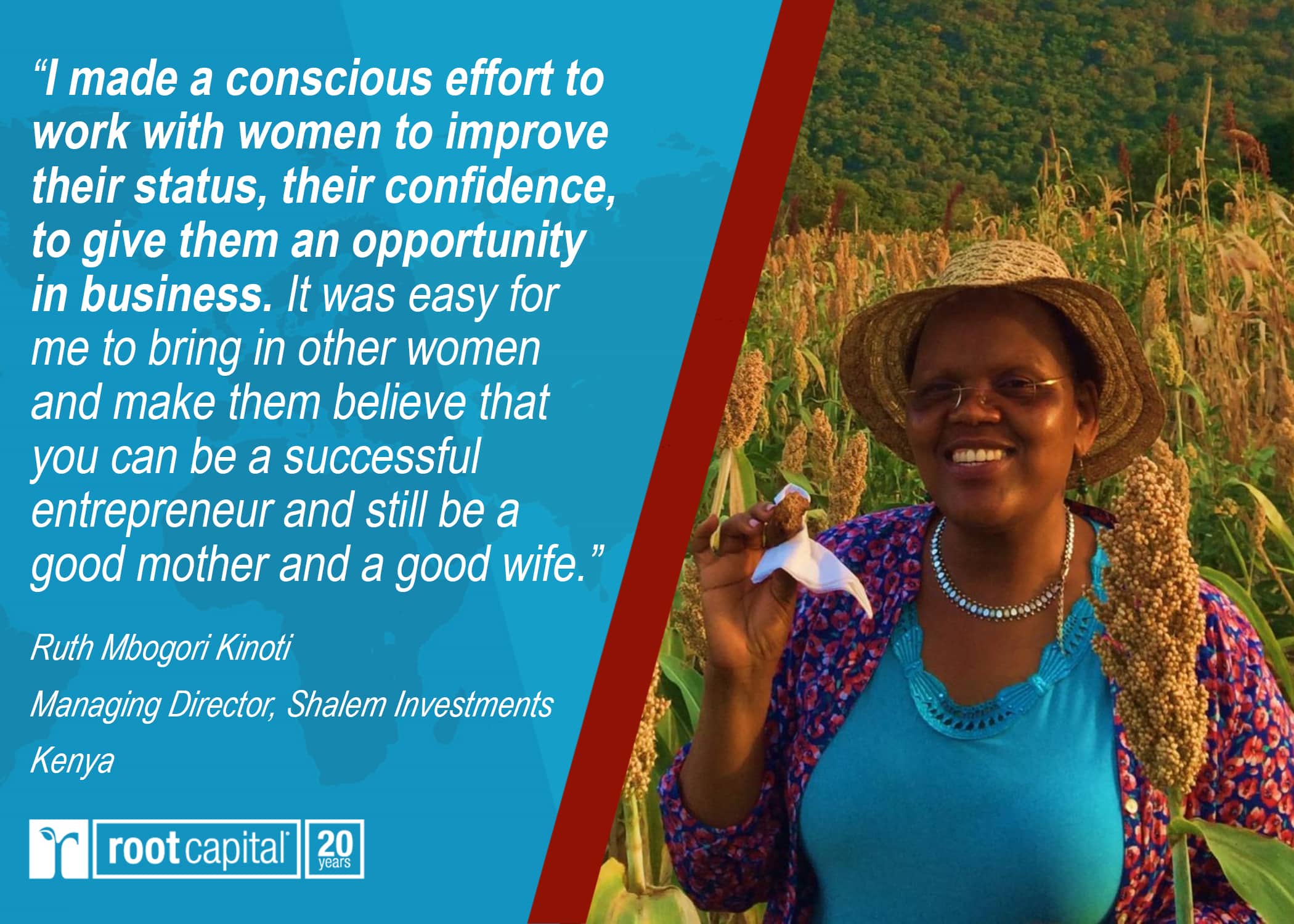
Taking these lessons forward
Over seven years of the Women in Agriculture Initiative, we’ve learned that support for rural women needs to be holistic, flexible, context-driven, and participatory. Without the deep relationships Root Capital has with our agribusiness clients—which allows us insight into the specific barriers rural women face and a platform through which we can reach women in meaningful ways—our efforts on gender inclusion probably wouldn’t have gone further than numerical counting.
Thanks to the lessons we’ve learned alongside our clients, we’re positioned to spend the next three years pursuing four overlapping goals:
-
1. We’ll grow the reach of the WAI, increasing the proportion of gender-inclusive and women-led businesses in our portfolio.
-
2. We’ll cultivate the potential of women working in agricultural enterprises by strengthening their capacity.
-
3. We’ll innovate by designing and implementing new strategies to help agricultural enterprises advance women’s inclusion.
-
4. We’ll amplify the lessons we learn to demonstrate to others how to holistically impact women across agricultural value chains.
To learn more about our plans for the next three years of the Women in Agriculture Initiative, contact team@rootcapital.org.

